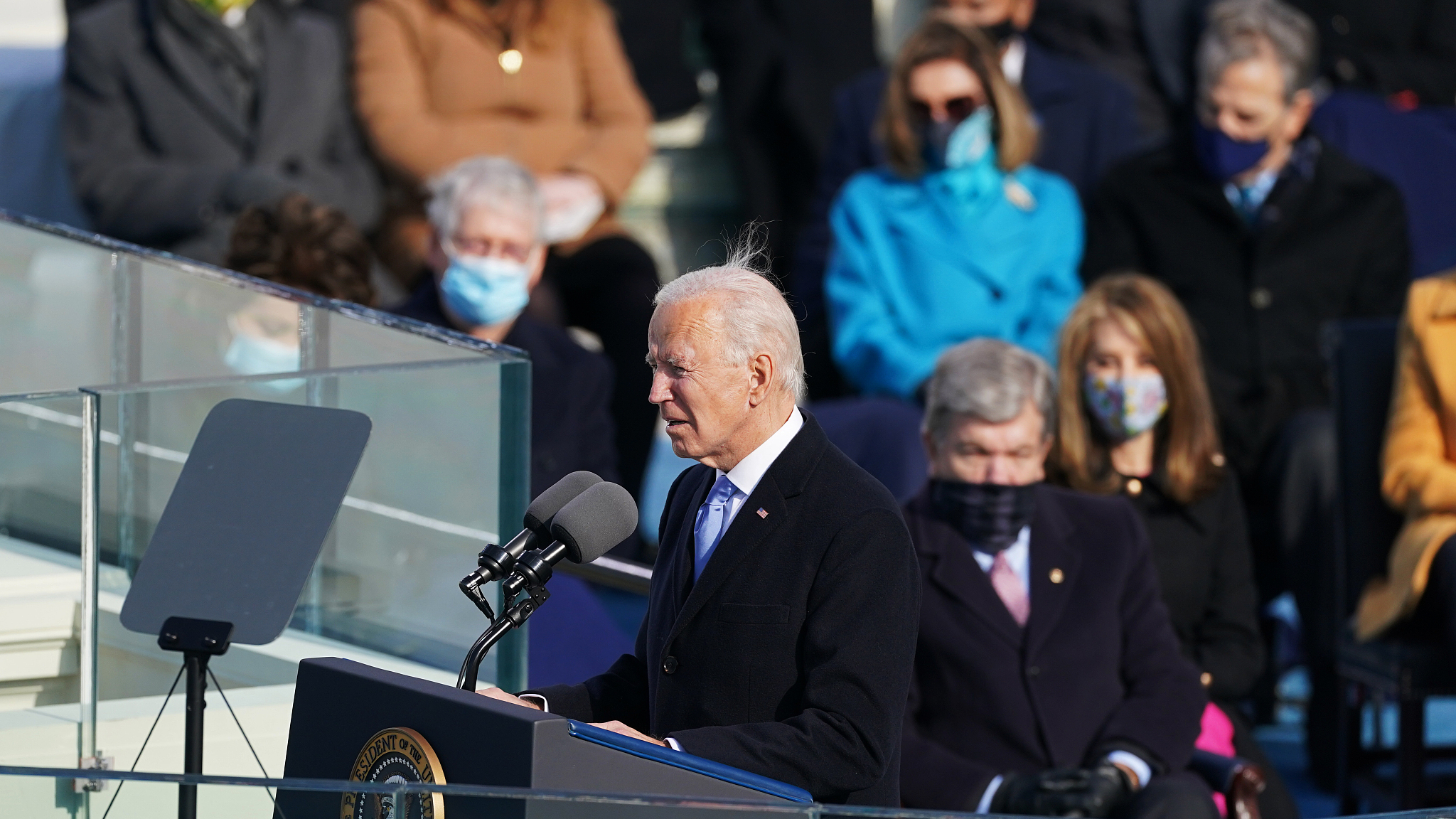
U.S. President Joe Biden delivers his inaugural address at the West Front of the U.S. Capitol in Washington, D.C., January 20, 2021. /VCG
U.S. President Joe Biden delivers his inaugural address at the West Front of the U.S. Capitol in Washington, D.C., January 20, 2021. /VCG
Editor's note: Keith Lamb is a University of Oxford graduate with an MSC degree in Contemporary Chinese Studies. His primary research interests are China's international relations and "socialism with Chinese characteristics." The article reflects the author's opinions and not necessarily the views of CGTN.
It's Wednesday, the sun is shining, Washington has been locked down and the troops have been vetted by the CIA for any pro-Donald Trump sympathizers. Joe Biden's inauguration is now protected against recriminations by some of the U.S. electorate who believe Biden is not the legitimate winner of the 2020 presidential election.
While voices in the U.S. constantly label China as a threat, clearly the greater threat to the U.S. comes from within. Furthermore, it is plain that the U.S., with its constant hysterical denunciations of China, actually poses a threat to China's system. With this internal and international contradiction in mind, is it possible that Biden's presidency will lead to an improvement in Sino-U.S. relations?
On a micro level, much has been made of Hunter Biden, Joe Biden's son's business dealings in China. This has been portrayed as compromising Joe Biden who will be more pro-China. However, the obvious fact is that just about all in the U.S. capital has dealings and investments in China. With U.S. democracy being so heavily co-opted by the lobbying power of U.S. transnational capital, which funds both parties, there will always be knotty relations and apparent conflict of interests within the U.S.' governing elite.
However, let's not assume that just because transnational capital does business in China means it will be more friendly to Beijing. Clearly, the U.S. neoliberal mass media takes a solid anti-China line. As such, the position of the U.S. elites is that they are happy to trade and profit from China while they simultaneously would like to take provocative actions against it for their own gains.
Biden, unlike Trump who predominantly stood for national capital, represents U.S. neoliberal transnational capital. As such, with his transnational outlook, he will deal with China in a more calm and diplomatic manner. But this calmness comes down to the pragmatism of representing his class interests rather than anything else.
Let us not forget Obama, who Biden served under as vice president, was also a mouthpiece for neoliberal capital. This was demonstrated by his bailout of private banks and the fact that his cabinet was chosen by Citibank. Obama, who initiated the pivot to Asia, which fuels defense spending, demonstrates that Obama was hardly China's ally and neither will Biden be.
The tragedy of U.S. democracy is that the important long-term strategic decisions are simply not in the hands of elected leaders. Instead, the deep state, formed by neoliberal capital, controls the strategic levers of power. This was manifestly demonstrated by Trump's Twitter cancellation.

Customers watch a speech by Joe Biden on a television during an election watching event at a local bar in Beijing, China, November 4, 2020. /Getty
Customers watch a speech by Joe Biden on a television during an election watching event at a local bar in Beijing, China, November 4, 2020. /Getty
Trump despite his stubbornness was unable to counter this neoliberal power. Indeed, he was played well by them. Thus, Biden who is supportive of neoliberal capital will tend to swim with the current of the deep state and not against it. As such, Biden's inauguration will make little difference to the decisions coordinated behind the scenes amongst a neoliberal military-industrial-complex alliance that pulls in think-tanks, the mass-media, capital, NGO's and universities.
The think tanks funded by Washington and the military-industrial complex will no doubt continue to misrepresent the situation in Xinjiang. Indeed, according to Colonel Lawrence Wilkerson, the former Secretary of State Colin Powell's chief of staff, the reason the U.S. is in Afghanistan is to disrupt China's Belt and Road Initiative with hard power and use the Uygurs to destabilize China's rise.
Going back from a macro outlook back to a micro outlook, it is said that Biden has a good relationship with Chinese President Xi Jinping. Biden claims to have spent more time with Xi than any world leader. When Biden toured China, in August 2011, he was accompanied to Beijing and Chengdu by Xi.
On that visit, Biden bought his granddaughter Naomi Biden who speaks Chinese. Furthermore, when Xi went to the U.S. in February 2012 he was accompanied by Biden to Los Angeles. There they jointly announced a deal to show more Hollywood movies in China every year.
Consequently, with the progress, both men have made together, China will no doubt feel that a presidency under Biden could be more business-like and less precarious than a Trump presidency. However, sometimes too much can be made of statements of personal friendship. Trump, after all, said he got on well with Xi and Trump's grand-children, who are learning Mandarin, sang Mo Li Hua (jasmine flower) when Xi met with Trump. Nevertheless, on the geopolitical level, Sino-U.S. relations hardly thrived.
As such, China will have to look less at individual rhetoric from U.S. presidents and more at long-term historical trends and actions. This is because, lamentably, when it comes to U.S. liberal democracy there is a small smorgasbord of rhetoric that creates the illusion of democracy. However, deep state machinations always prevail and Biden, no matter how nice he is, won't be able to change this because power in the U.S. doesn't lie in democratically elected officials.
(If you want to contribute and have specific expertise, please contact us at opinions@cgtn.com.)

